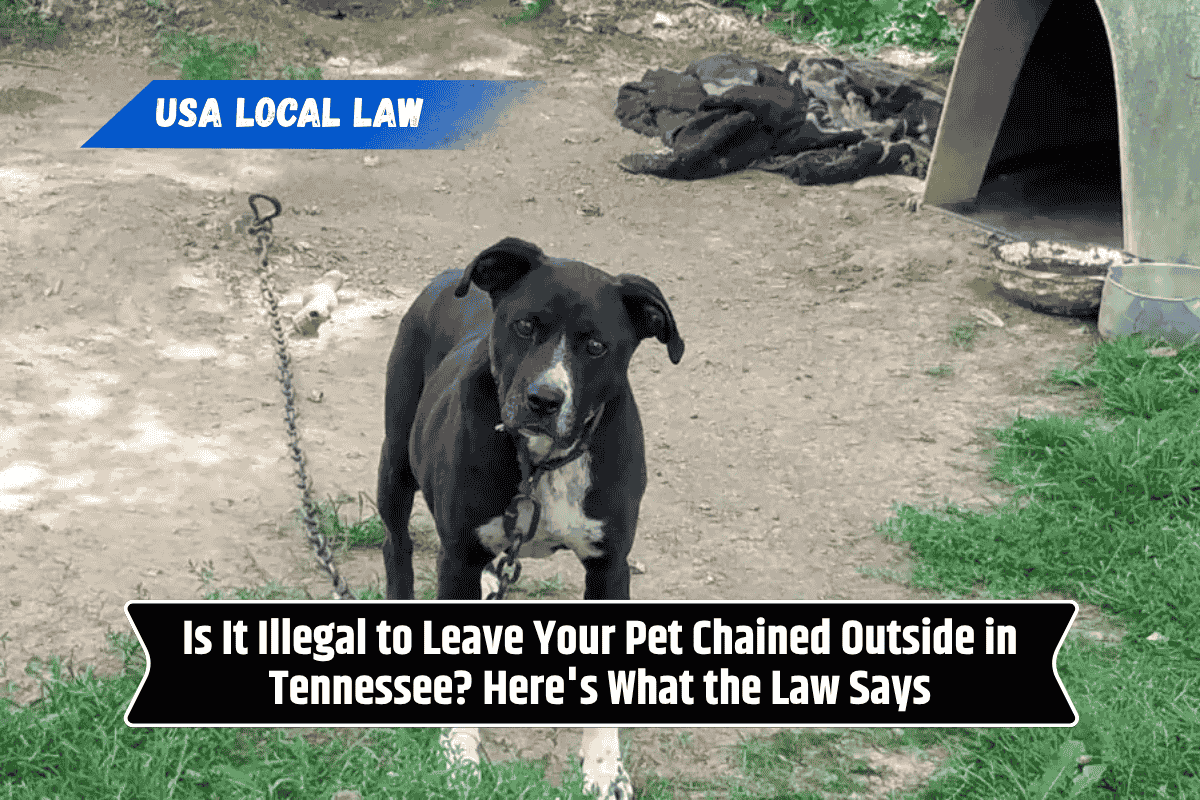Many pet owners in Tennessee have outdoor spaces where their dogs or other animals like to roam. Sometimes, they chain their pets outside for safety or to keep them from running away. But is it legal to leave your pet chained up in your yard all day or night?
In this guide, we’ll explain what Tennessee law says about tethering pets outside, how long you can leave your animal tied up, and what rules you need to follow to avoid trouble with animal control or the police.
What Is Tethering?
Tethering means tying your pet to a fixed object like a tree, pole, fence, or post using a rope, chain, or leash. It’s a common practice, especially in rural areas, but it can become a problem if it’s not done safely or humanely.
Is Tethering Pets Legal in Tennessee?
Yes, tethering is legal in Tennessee, but there are rules and restrictions. You cannot just leave your pet tied up outside however you want. The law protects animals from cruelty and neglect, and chaining a dog for long hours or in bad weather can lead to charges of animal cruelty.
Tennessee does not have a statewide ban on tethering, but many local cities and counties have passed their own laws. For example, in places like Nashville and Memphis, there are tighter rules about how and when a dog can be tethered.
Key Rules About Tethering in Tennessee
While state law doesn’t fully ban chaining pets, it requires that animals be kept in safe, healthy conditions. Here are some general guidelines that apply across most parts of Tennessee:
You cannot tether a pet in extreme weather, such as freezing cold, heavy rain, or very hot temperatures.
The chain or leash must not be too short — pets should be able to move around, lie down, and stand comfortably.
The tether must not cause pain, injury, or choke the animal.
You must provide food, water, and shelter if your pet is tied up outside.
In some cities, you cannot leave a dog tied up for more than a certain number of hours per day (e.g., no more than 12 hours in 24 hours).
Local Laws May Be Stricter
Cities like Chattanooga, Knoxville, and Nashville have stricter anti-tethering laws. Some local laws completely ban unattended tethering, especially if it is continuous or overnight.
For example:
Nashville: It’s illegal to leave a dog tethered for more than 15 minutes without supervision.
Chattanooga: Prohibits tethering between 10 PM and 6 AM and during extreme weather.
It’s important to check your city or county’s animal control laws, as they may be more detailed than state law.
What Happens If You Break the Law?
If you’re found violating tethering rules in Tennessee, the penalties can vary. Animal control officers may give you a warning first, but if the situation is serious or ongoing, you could face:
Fines
A court summons
Removal of the animal
Animal cruelty charges (in serious cases)
The law takes animal welfare seriously, especially if your pet is injured, becomes sick, or dies as a result of being chained too long without proper care.
Why Long-Term Tethering Is Discouraged
Even if it’s legal in your area, experts and veterinarians strongly discourage leaving pets chained for long periods. It can make them anxious, aggressive, or depressed. Dogs are social animals and need interaction, exercise, and mental stimulation.
Long-term chaining can also lead to physical injuries, like neck wounds, and make pets more likely to act out or bite. That’s why many places are slowly introducing no-tethering laws or promoting fenced yards or dog runs instead.
What You Can Do Instead
If you want your pet to enjoy the outdoors safely, here are better options:
Use a fenced yard where your dog can move freely.
Set up a secure dog run with shelter, food, and water.
Only tether your pet when you’re nearby and for a short time.
These options keep your pet safe, healthy, and out of legal trouble.
Leaving your pet chained outside in Tennessee is not fully illegal, but it is heavily regulated, especially at the local level. The law focuses on protecting animals from neglect, extreme weather, and long-term suffering.
As a responsible pet owner, it’s your duty to ensure your pet is safe, comfortable, and well cared for — whether indoors or outdoors. Always check your local laws and avoid tethering your pet for long periods, especially when you’re not around.
